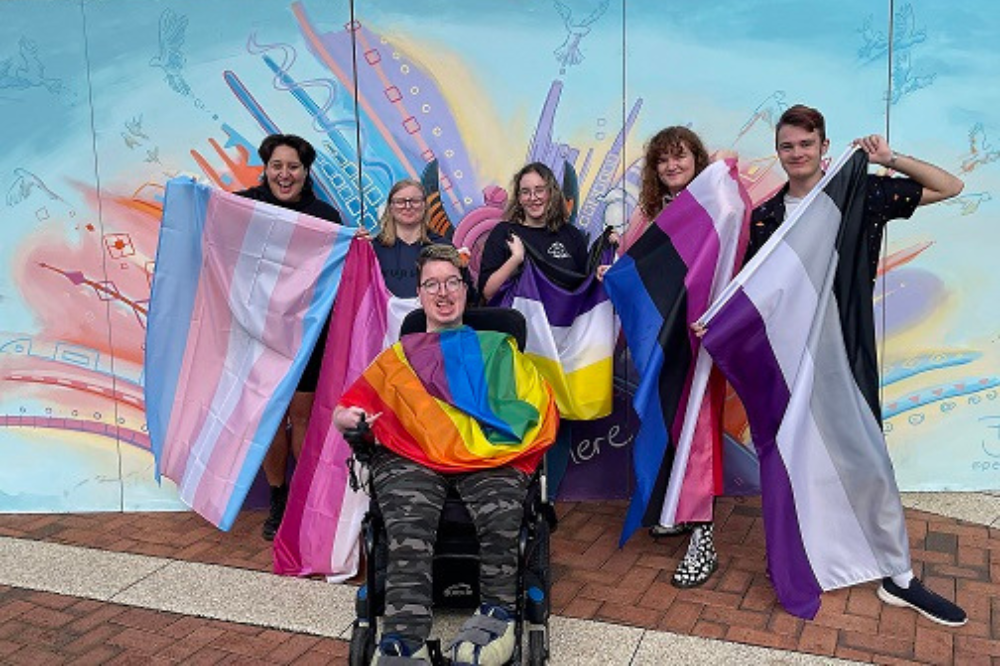
Studies show three quarters of trans men, and two thirds of trans women and non-binary people feel unsafe or uncomfortable at their educational institution, compared with less than 50% of cisgender men and cisgender women.
While trans people are diverse and come from all walks of life, they are among the most marginalised and socioeconomically disadvantaged groups in Australia.
Tragically, almost 50% of trans people have attempted suicide, sparking calls for greater, and more urgent, support for this marginalised group.
November 13-19 marks Trans Awareness Week, leading to Trans Day of Remembrance on Monday 20 November.
In early 2020, Edith Cowan University (ECU) identified the need for a proactive approach to supporting and affirming trans, gender diverse, and non-binary (TGDNB) students, staff, alumni and the wider community.
A new paper published in the Australian and New Zealand Student Services Association Journal reveals the issues and challenges TGDNB students face, and the guidelines ECU developed and implemented to better support them.
ECU Equity Project Coordinator Stevie Lane (they/them) said while awareness and education on LGBTIQA+ experiences and actions for allyship were already in place at ECU, this project focused specifically on the unique experiences and needs of TGDNB people.
“Our new guidelines aim to empower TGDNB community members, and the ECU staff supporting and working alongside them,” they said.
‘I feel seen and heard’
Liz Prasil (she/her), a transfeminine student studying a Bachelor of Psychology, Criminology and Justice at ECU, said her study experience has been like any other student.
“I feel seen and heard, my identity and name respected, and have faced no overt or covert forms of general queerphobia,” she said. “I can’t say I’ve ever felt anything but validated at ECU.”
Liz said the University’s lecturers speak and listen to her as they do to every student.
“Some have gone to lengths to show a great understanding of queer identities within their lectures,” she said.

Liz said on days that recognise TGDNB and LGBTIQA+ students, she appreciates how lecturers often took a small section of time, or a slide to recognise it.
“Especially since it is not required of the staff to acknowledge it in the lecture, it often makes me feel proud to consider myself as part of the LGBTIQA+ community,” she said.
She praised the resources and guidelines implemented and the attitudes of staff toward LGBTIQA+ students.
“I appreciate how simple and fast processes like changing your student name or gender markers are to be implemented, as well as how understanding, accommodating and flexible the staff are,” she said.
She also welcomed lecturers attaching their respective pronouns to their email because she said it made her feel accommodated.
“This is a subjective perception and by no means do I believe any and all lecturers must or even should attach their pronouns, but their addition notifies us they are aware of our situation and seek to acknowledge it.”
Challenges and issues
To better understand the issues and challenges facing TGDNB students, ECU’s Equity Projects team conducted a review of internal university surveys and consultations, literature, and best practice examples from other institutions.
“The review confirmed the stigma, discrimination, and violence experienced by TGDNB people, impacting on their health and wellbeing and therefore their ability to meaningfully engage in education and learning,” Stevie said.
TGDNB students reported a range of issues that may impact their ability to succeed at university.
“Students reported challenges such as family non-acceptance; financial problems and homelessness due to being kicked out of home or difficulties in finding employment due to gender identity; not feeling comfortable to share their gender identity with university staff or peers due to fear of bias, misunderstanding, or belittling; concern for practicum placements; and mental health concerns,” Stevie said.
Guidelines for support
Using the information gathered in the review the Pride @ ECU Sub-Committee developed a practical resource for the University aimed at empowering the TGDNB community and the ECU staff supporting and working with them.
The TGDNB support guidelines were designed to:
- Support TGDNB students, staff and alumni to affirm their gender at ECU.
- Provide guidance for students, staff, and alumni who may be supporting TGDNB people and communities at ECU.
- Increase knowledge of TGDNB experiences so people at ECU understand why it's important to provide specific support to TGDNB people while at university.
Where is ECU now?
Stevie said since the guidelines were implemented in 2021 the ECU community now had greater awareness of the specific difficulties TGDNB students may experience during their studies.
“This means more educated support for these students, no matter what stage they might be at with affirming their gender,” they said.
Some ECU wide examples of improvements towards the experiences of TGDNB students include:
- All gender bathrooms introduced across all campuses, including plans for the future city campus, which will include all gender bathrooms in multiple locations.
- Students are not required to provide any documentation to update their title, gender marker, and preferred/affirmed name in the Student Information System.
- A pronounced increase in the visibility of pronouns usage among staff members.
- A pronounced increase in referrals to internal and external support services and social groups.
- Students and employees can include their pronouns in ECU’s Learning Management System, Canvas (Course Management System), and on Microsoft Teams.
- Students can designate the name they wish to have called out during their graduation ceremony and, should they change their name legally after graduation, they can get a new testamur at no cost.
- Since 2022, ECU has hosted a TGDNB Meet and Greet session as part of the orientation program each semester. This is in addition to Pride and LGBTIQA+ events.
- ECU asks students on enrolment if they are part of the LGBTIQA+ community. The question is optional, but many students are choosing to select ‘yes’ and enabling provision of specialised communications for support and involvement in targeted initiatives.
Despite some challenges, Stevie said much had already been achieved, and they remained optimistic about ongoing long-term change.
“ECU has made significant improvements toward TGDNB student experiences, but there is still more work to be done,” they said.
“One of the most important things we can do for students is listen to where they are at and what they need, then tailor our support to their individual needs.”
The original version of this story appeared as a media release from Edith Cowan University.


